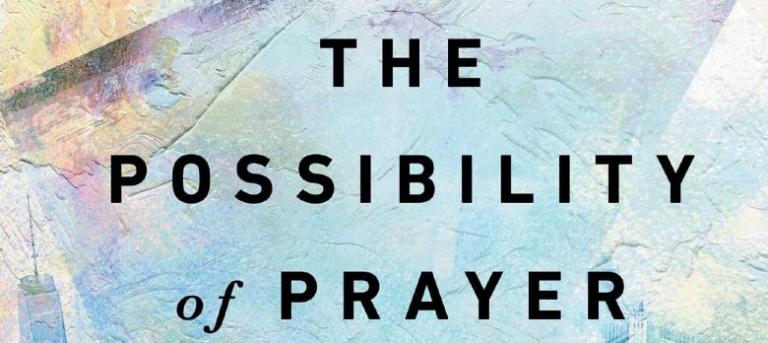
Mention prayer around most Christians and you are sure to see some people hang their heads in shame. We know that we ought to pray, but we often don’t, and this produces guilt and shame. Then, the guilt and shame that we feel over our lack of time in prayer keep us from praying. Then, when we finally do pray, we are confused about what to pray and give up because of the awkwardness.
John Starke has given us an excellent aid to focus on our prayer lives with The Possibility of Prayer. In it, he reminds us that our identity is not found in our performance, but in Christ. This encourages us to pray because our audience with God does not depend on our goodness, but Christ’s. He also speaks into our busy lives to show why we need to give priority to prayer in a time when we are always focused on what we have produced. Starke’s book encouraged me to slow my pace of life so I can give time and attention to prayer.
These were my favorite quotes from The Possibility of Prayer:
“We live in an age of efficiency. We judge our use of time by what we accomplish or produce. Anything we do that seems inefficient or unhurried is a waste of time. ‘I didn’t get anything done today.’ If that’s how we evaluate our use of time, is it any wonder we rarely justify the time of prayer, much less any meaningful spiritual exercise.” (6)
“Prayer is not possible because we have somehow made ourselves worthy of God’s attention, but because God has made himself known to us. We did not have to ascend like phoenixes out of our ashes to get God’s attention, but God descended into the depths of dust with us.” (15)
“A life of prayer and spiritual depth is one of learning how to experience love truly with God and then also with others.” (40)
“In Christ and before the courts of heaven, we don’t have to prove ourselves. We don’t have to be a false version of ourselves. We can simply be ourselves and love. When you pray, repeat that last line to yourself and believe it.” (43)
“A life of prayer and stillness with God is the place reactionary hearts go to die and be raised as something deeper.” (51)
“We must not wait until we feel better about ourselves before we come to God; that’s just pride masked by self-loathing. Coming quickly to God in repentance is a sign of humility, of putting all our trust in the blood of Christ, knowing that we have no worthiness in ourselves.” (73)
“If a spiritual leader tells you that all your encounters with God should be like Mount Sinai, then either that leader has not been praying for long or is trying to sell you something. Not every prayer will lead to amazement, but every prayer deserves our pondering.” (89)
“Solitude saves us from our own perspective, encouraging us toward a wider view than we’re accustomed to or comfortable with–a view that is not our own. God has a view of the entire landscape, and we need him in order to see reality from beyond our incestuous imaginations. Without him, we get stuck in the loop of our own self-grandeur.” (122)
“Heavy social media use makes solitude with God scattered and frustrating. But healthy rhythms of solitude and even boredom, supported by resistance to technology (maybe through intentional times of disconnecting from social media), can bring surprising richness and refreshment to our lives.” (132)
“Solitude develops our inner lives to love what God loves–and God loves our neighbors.” (133)
“The best way to love and care for those in our community is to regularly practice solitude with God.” (133)
“The rhythm of feasting and fasting forms hearts at rest with God rather than hearts that restlessly crave the things of this world. It makes the life of prayer easier. Fasting teaches my heart to hunger for the deep things of God. Prayer is the daily feast on those things.” (149)
“The Sabbath was made for more than just recovery or preventing exhaustion.” (152)
“The Sabbath is God’s weekly invitation to experience spiritual vibrancy that many Christians, for one reason or another, have refused to accept.” (152)
“The practice of Sabbath teaches us that nothing in this life is too important that it cannot be set aside in order to receive what God has for us rather than what we can make or do for ourselves. Our daily rhythms of prayer are small sabbaths–ways of saying to our soul, ‘Nothing is so important that it can’t regularly be set aside to receive what God has for me today in his Word and in prayer.” (157)
“The Sabbath is our confession that the world is held together by Christ’s hands, not ours.” (158)
“To be a healing and restorative practice, the Sabbath must be a weekly rhythm. We must figure out how to make time for a day once a week when we’re not working but instead are putting joy and blessedness in the forefront.” (160)
“When Christ said, ‘It is finished’ on the cross, it was a death blow to finding our worth and fullness through our work.” (165)
“The more alienated we are from other Christians, the more we will be alienated from Christ himself.” (169)
“We simply cannot depend on a personal prayer life for a healthy spiritual life–or even an adequate one. Without other Christians and the experience of worshiping with them on a regular basis, our personal prayer lives will suffer.” (169)
“If you’ve ever wondered what God wants for your life, here is at least a partial answer: to be deeply connected and involved in the body of Christ. You won’t be satisfied until you are.” (176)
(You can read more of my favorite quotes from great books here.)
Related Posts:
“The Best Quotes from Your Future Self Will Thank You”










